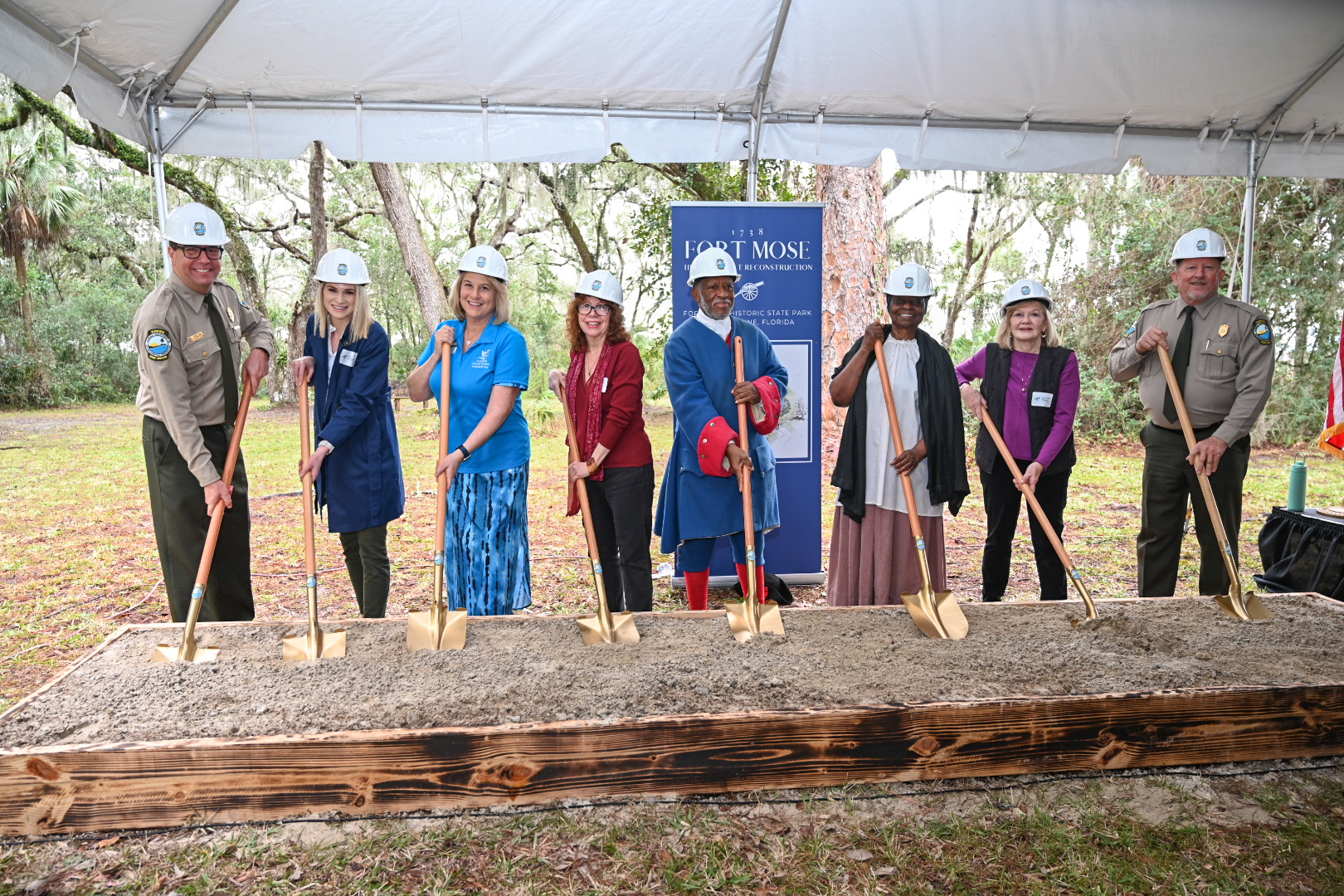
 Fort Mose Unveils Historic Reconstruction Project in Landmark Groundbreaking Ceremony
Fort Mose Unveils Historic Reconstruction Project in Landmark Groundbreaking Ceremony
~ Honors first legally sanctioned free Black community in present-day United States~
ST. AUGUSTINE, Fla. — In a collaborative effort, the Fort Mose Historical Society and the Florida State Parks Foundation hosted a historic groundbreaking ceremony on Friday, Jan. 19, 2024.
Initially built almost four decades before the American colonies declared their independence, Fort Mose was the first legally sanctioned free Black community in the present-day United States. Now, efforts to begin reconstruction of the 1738 fort on the grounds of Fort Mose Historic State Park are set to begin and be completed by late 2024.
“As we break ground on the reconstruction of Fort Mose, we are not merely rebuilding walls — we’re creating a tribute to the resilient and determined freedom seekers who made the first free Black settlement a possibility,” said Charles Ellis, president of the Fort Mose Historical Society. “The Fort Mose Historical Society is honored to have played a pivotal role in launching this project, providing the public with an opportunity to consider the true value of freedom. With the community’s support, we embark on a journey to create a dynamic space where the echoes of the past will resonate in the hearts and minds of all who visit.”
“Today marks a historic moment in our journey to preserve and celebrate our state’s and our nation’s rich cultural heritage,” said Julia Gill Woodward, CEO of the Florida State Parks Foundation. “The Fort Mose groundbreaking ceremony signifies a commitment to fostering a deep connection between our past and present. This project is a tribute to the enduring spirit of community and the profound importance of preserving our shared history.”
The original Fort Mose was established in 1738, marking a new beginning for a wave of freedom seekers who first arrived in St. Augustine in 1687. That version of the fort met its end with the Battle of Bloody Mose in 1740.
The Fort Mose Historical Society launched the fort reconstruction project in 2012 and began fundraising efforts for the reconstruction. The Florida State Parks Foundation was awarded a $933,000 grant through the Florida Department of State’s Florida African-American Cultural & Historical Grant Opportunity for fort reconstruction. This project transcends the simple reconstruction of a landmark; it will convey the vital history of Fort Mose to the world, a pivotal chapter of our nation’s narrative.
The project was also made possible through the generosity of several community partners and organizations, including St. Johns County, The Jacksonville Jaguars Foundation, The St. Augustine Amphitheatre’s Fort Mose Jazz & Blues Series, The Delores Barr Weaver Legacy Fund, The Lastinger Family Foundation, Florida Power and Light, The Bailey Group, Wells Fargo, Northrop Grumman, Florida Blue, and The Community Foundation for Northeast Florida.
“We are excited to break ground at Fort Mose after so many years of hard work and dedication,” said Chuck Hatcher, director of the Florida Park Services.“The new fort reconstruction will provide a remarkable experience for visitors from around the world, and we are grateful for everyone who has helped bring this project to life.”
For more information, please visit fortmose.org. Be sure to “Like” us on Facebook and follow us on Instagram.
# # #
ABOUT FORT MOSE
Fort Mose is the site of the first legally sanctioned free African settlement in what is now the United States. In 1738, an estimated 100 Africans made Fort Mose their home and sanctuary in seeking liberation from English enslavement amid a large-scale power struggle between European powers. In 1994, Fort Mose was designated as a Historic National Landmark.
ABOUT THE RECONSTRUCTION PROJECT
The Florida State Parks Foundation is collaborating with the Fort Mose Historical Society and the Florida Park Service to reconstruct the 1738 fort on the grounds of Fort Mose Historic State Park, which is set to be completed by late 2024. In addition to the fort’s reconstruction, this project will outfit the fort with interpretative resources so park visitors may better understand the historical significance of Fort Mose.
